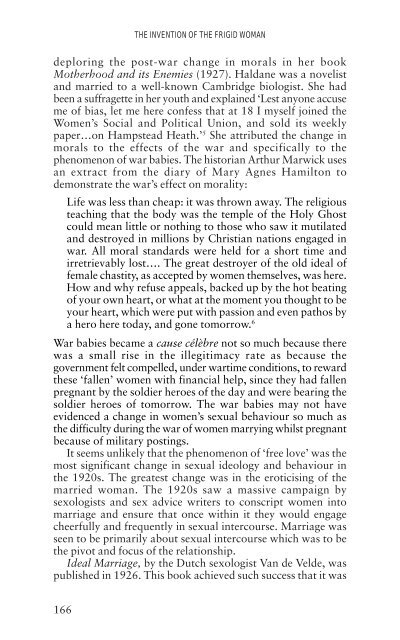The Spinster and Her Enemies - Feminish
The Spinster and Her Enemies - Feminish
The Spinster and Her Enemies - Feminish
You also want an ePaper? Increase the reach of your titles
YUMPU automatically turns print PDFs into web optimized ePapers that Google loves.
THE INVENTION OF THE FRIGID WOMAN<br />
deploring the post-war change in morals in her book<br />
Motherhood <strong>and</strong> its <strong>Enemies</strong> (1927). Haldane was a novelist<br />
<strong>and</strong> married to a well-known Cambridge biologist. She had<br />
been a suffragette in her youth <strong>and</strong> explained ‘Lest anyone accuse<br />
me of bias, let me here confess that at 18 I myself joined the<br />
Women’s Social <strong>and</strong> Political Union, <strong>and</strong> sold its weekly<br />
paper…on Hampstead Heath.’ 5 She attributed the change in<br />
morals to the effects of the war <strong>and</strong> specifically to the<br />
phenomenon of war babies. <strong>The</strong> historian Arthur Marwick uses<br />
an extract from the diary of Mary Agnes Hamilton to<br />
demonstrate the war’s effect on morality:<br />
Life was less than cheap: it was thrown away. <strong>The</strong> religious<br />
teaching that the body was the temple of the Holy Ghost<br />
could mean little or nothing to those who saw it mutilated<br />
<strong>and</strong> destroyed in millions by Christian nations engaged in<br />
war. All moral st<strong>and</strong>ards were held for a short time <strong>and</strong><br />
irretrievably lost…. <strong>The</strong> great destroyer of the old ideal of<br />
female chastity, as accepted by women themselves, was here.<br />
How <strong>and</strong> why refuse appeals, backed up by the hot beating<br />
of your own heart, or what at the moment you thought to be<br />
your heart, which were put with passion <strong>and</strong> even pathos by<br />
a hero here today, <strong>and</strong> gone tomorrow. 6<br />
War babies became a cause célèbre not so much because there<br />
was a small rise in the illegitimacy rate as because the<br />
government felt compelled, under wartime conditions, to reward<br />
these ‘fallen’ women with financial help, since they had fallen<br />
pregnant by the soldier heroes of the day <strong>and</strong> were bearing the<br />
soldier heroes of tomorrow. <strong>The</strong> war babies may not have<br />
evidenced a change in women’s sexual behaviour so much as<br />
the difficulty during the war of women marrying whilst pregnant<br />
because of military postings.<br />
It seems unlikely that the phenomenon of ‘free love’ was the<br />
most significant change in sexual ideology <strong>and</strong> behaviour in<br />
the 1920s. <strong>The</strong> greatest change was in the eroticising of the<br />
married woman. <strong>The</strong> 1920s saw a massive campaign by<br />
sexologists <strong>and</strong> sex advice writers to conscript women into<br />
marriage <strong>and</strong> ensure that once within it they would engage<br />
cheerfully <strong>and</strong> frequently in sexual intercourse. Marriage was<br />
seen to be primarily about sexual intercourse which was to be<br />
the pivot <strong>and</strong> focus of the relationship.<br />
Ideal Marriage, by the Dutch sexologist Van de Velde, was<br />
published in 1926. This book achieved such success that it was<br />
166

















